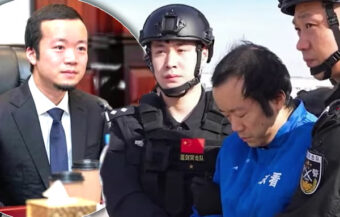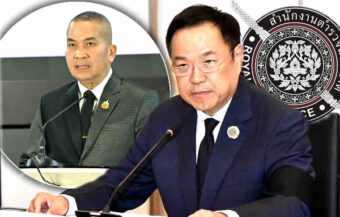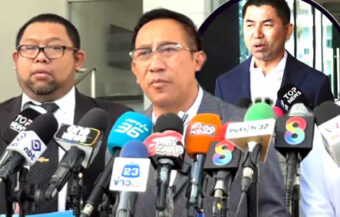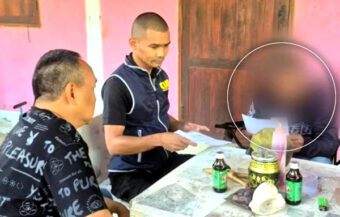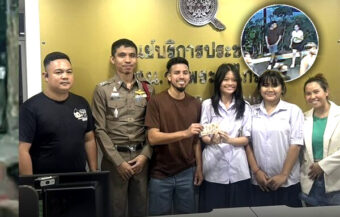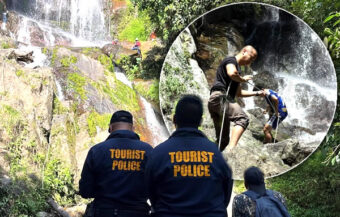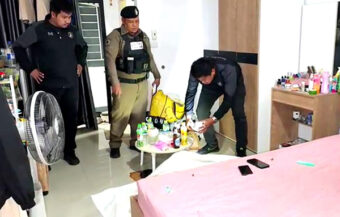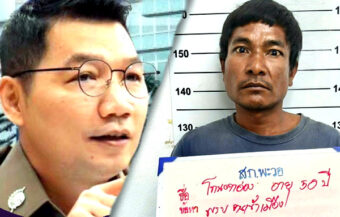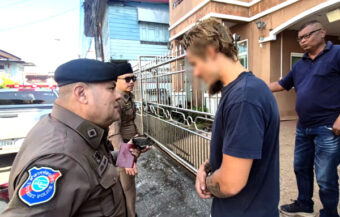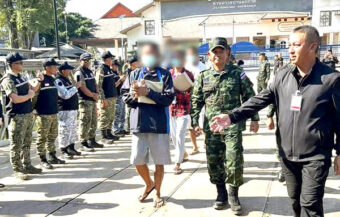Thailand and Cambodia face a major threat from Dragon Head, the Chinese mafia boss, as Chen Zhi faces US charges exposing scams, political links and infiltration of banks and businesses. The scandal threatens financial stability and security across Southeast Asia.
A massive FBI and U.S. Department of Justice investigation last week exposed Cambodian Chinese national Chen Zhi’s ties to the Chinese mafia’s scam cartel in Cambodia with links to Thailand. Intelligence now links the mafia and a huge conglomerate, including a bank, to political and business elites, especially the 2022 Grey Capital network in Thailand, which still threatens to poison Thailand’s financial system. Charged in a U.S. court and facing 40 years in prison, Chen appears to be just a lieutenant for the real 14K boss, Wan Kuok-koi, known as Dragon Head.
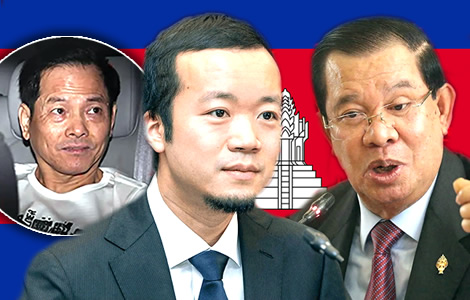
The Chen Zhi case has unveiled a sprawling and sophisticated criminal network in Southeast Asia. Sources close to the investigation claim that Chen Zhi, a Chinese-Cambodian national, is merely a front man. Essentially, he represents the Chinese mafia.
Moreover, investigators say the syndicate controlling him is the notorious “14K” gang. This group expanded from China, Macau, and Hong Kong in 2013, under pressure from Chinese President Xi Jinping. Subsequently, it moved operations to Sihanoukville, Cambodia, establishing a powerful base.
The 14K gang is led by Wan Kuok-koi, widely known as Dragon Head. He rarely appears in public but controls operations behind the scenes. According to experts, 14K generates enormous wealth through diverse illicit activities. Furthermore, the gang reportedly maintains a partnership with Cambodia’s leadership.
Hun Sen regime reportedly receives 19% of 14K gang revenue, with evidence of China remittances
Reports indicate that the Hun Sen-led regime receives 19% of the gang’s revenue. Large remittances from China to Cambodia provide clear evidence of this arrangement.
Significantly, the gang’s influence extends to warlord-controlled areas of Myanmar. Previously, in 2020, international pressure forced 14K to move out of Sihanoukville. Since then, scam centres have relocated across Cambodia.
Meanwhile, investigations reveal links between the gang and Chinese tycoon Du Hao. Du Hao was arrested in Thailand in 2022 in a massive Royal Thai Police investigation that took two and a half years before reaching the courts.
At the same time, he allegedly provided funding to a major political party. In turn, the Election Commission decided that the funding could not be traced to illegality. In February 2025, the Thai Criminal Court dismissed charges against Du Hao and over twenty others, citing inconclusive evidence.
Chinese funds and nationals reportedly infiltrate Thailand threatening security and small business
At that time, former massage parlour tycoon and activist Chuwit Kamolvisit demanded accountability. He warned of billions of dollars in Chinese funds infiltrating Thailand. Indeed, he also warned of millions of Chinese nationals aligned with the Grey Capital Group entering the kingdom. Mr. Chuwit said this posed a threat to the country’s national security.
Investigations found that the funds targeted Thailand’s small business sector. Moreover, exposés revealed Chinese nationals obtaining fake visas. Some even arranged for Thai parents to put their names on the birth certificates of Chinese children born in Thailand. These revelations highlighted the gang’s infiltration into legitimate systems.
The 14K gang is also linked to a wide range of criminal operations. These include scam compounds, online fraud, drug trafficking, and human trafficking across Southeast Asia. Importantly, there is evidence that the gang operates networks in Thailand.
On Sunday, Chuwit urged Prime Minister Anutin Charnvirakul to act against these criminal networks. He also promised the embattled Prime Minister that this would secure additional votes in Bangkok ahead of the 2026 General Election. Meanwhile, the People’s Party is accusing coalition elements of maintaining links to organised crime.
Chuwit warns Thailand’s Prime Minister about criminal networks and potential impact on 2026 election
International investigators are now focusing on Cambodia’s leadership while pursuing Chen Zhi’s arrest. Notably, on Saturday, the Cambodian Ministry of the Interior expressed support for Chen Zhi. The Ministry’s spokesman, Touch Sokhak, highlighted that Prince Holding Group met all requirements to operate in Cambodia. He insisted it was treated no differently than other major companies investing in the country.
Presently, Prince Group Holdings is a vast conglomerate in Cambodia with links to property development, the financial industry and technology.
For instance, it also operates a leading retail bank in the country, which has seen a run on its branches as distressed depositors sought last week to withdraw cash.
In short, this is not simply a criminal case; it threatens to expose the Cambodian leadership and state, in addition to the Chinese mafia criminals.
Nevertheless, Mr. Sokhak said the Cambodian regime would cooperate with international law enforcement if such a request was backed by conclusive evidence.
“We do not protect individuals who violate the law,” he declared. However, he added that as of now, there is no reason for Cambodian authorities to act against Prince Group Holdings or Chen Zhi, who is a key advisor to both Hun Sen and his son, Prime Minister Hun Manet.
Thai parliamentary committee monitors events as Chen Zhi faces asset forfeiture lawsuit in United States
In the meantime, the Thai House of Representatives Committee on National Security, Border Affairs, National Strategy, and National Reform is actively monitoring developments. The committee is led by People’s Party firebrand MP and parliamentary strategist Rangsiman Rome.
Mr. Rome has publicly called for the removal of a top deputy prime minister allegedly linked to criminal networks. Rising tensions from this case are placing Prime Minister Anutin on the defensive.
Chen Zhi, owner of Prince Group, is considered a key financial brain and lieutenant for 14K. Analysts say he managed the syndicate’s investments and financial operations in Cambodia. Last Tuesday, October 14, 2025, the U.S. Department of Justice filed an asset forfeiture lawsuit against him.
The suit targeted Prince Holding Group and neutralised over $15 billion in Bitcoin. According to the DOJ, these assets stemmed from electronic fraud and money laundering. Chen Zhi allegedly directed Prince Group affiliates to use forced labour and engage in online scams across ASEAN countries.
Chen Zhi confirmed as key figure in 14K overseeing investments and laundering in Southeast Asia
Songrit Phonengen, a Mekong regional expert, confirmed Chen Zhi’s central role in the 14K gang. He explained that the gang expanded scam networks along the Mekong River and throughout Southeast Asia.
Furthermore, Wan Kuok-koi, Dragon Head, remains the ultimate decision-maker. Songrit said 14K selectively recruits people with specialised skills. Chen Zhi was invited for his expertise in finance and investment. Once recruited, members manage funds, oversee laundering, and distribute money across borders.
The gang generates revenue through online casinos, investment scams, cryptocurrency schemes, and human trafficking. Profits are moved across borders, laundered through banks and casinos, and then reinvested. Often, funds are converted into gold or used to purchase high-value assets. Observers report a recent increase in gold inflows into Cambodia, indicating active syndicate operations.
14K gang fled Hong Kong and Macau crackdown and re-established bases in Cambodia and Thailand
Historically, 14K emerged from drug trafficking, human trafficking, prostitution, and online casino operations in Hong Kong and Macau. When Chinese President Xi Jinping announced a nationwide crackdown in 2013, members fled.
They disguised themselves as investors in legitimate companies. Sihanoukville became their first major base between 2013 and 2019. In 2020, Hun Sen cracked down on the gang under Chinese pressure. Many members fled to Thailand and other neighbouring countries.
Du Hao, a Chinese grey capital suspect arrested in 2022, was among those linked to 14K. The Thai Criminal Court in February 2025 dismissed charges against him, highlighting systemic challenges in prosecuting syndicate leaders. Songrit revealed that asset seizures by the U.S. and U.K. will significantly impact the Cambodian scam network.
Prince Bank, connected to Chen Zhi, has been sanctioned. Consequently, many businesses are experiencing liquidity crises. Analysts predict scammers in Cambodia will face increasing difficulty operating internationally.
Hun Sen family profits from gang operations while organised crime infiltrates politics across Southeast Asia
The Hun Sen family has historically benefited from the gang’s operations. They reportedly received a 19% cut of revenue since 2013. Data from the People’s Bank of China shows yuan remittances from China to Cambodia totalled $157 billion between 2013 and 2019.
This implies that Hun Sen’s share amounted to billions of dollars. Experts say more arrests are expected daily, although ringleaders often evade capture. Satellite images from Sihanoukville show coordinated movements of personnel after crackdowns.
The gang also exploits human trafficking networks across Southeast Asia. Victims are reportedly exploited in Cambodia, Thailand, Laos and Myanmar. Moreover, illegal gambling operations serve as hubs for laundering illicit funds. Political analysts warn that corruption has allowed 14K to operate unchecked for years. This situation has created a complex interplay between crime, money and politics.
Thailand’s political sphere is now under scrutiny. Rangsiman Rome emphasises the urgent need to address syndicate influence within government.
Opposition parties argue that some coalition members maintain ties to organised crime. Public awareness of these links could shape the outcome of the 2026 General Election. Pressure on political figures is expected to intensify as investigations progress.
Chen Zhi’s cross-border piracy demonstrates financial sophistication and systemic threat in Southeast Asia
Chen Zhi’s financial activities have far-reaching effects. He oversaw cross-border transfers, often converting illicit funds into assets such as gold or real estate. The DOJ contends that these operations facilitated widespread electronic fraud and money laundering. Analysts warn that dismantling the network requires targeting its financial infrastructure, not just individual operatives.
Regional experts argue that the crackdown on Chen Zhi marks a turning point. Cambodia’s compliance—or indeed non-compliance—with international pressure could mark a tipping point for the rogue state.
Authorities presently expect arrests, asset seizures, and robust law enforcement measures. Analysts predict the pressure will destabilise long-standing criminal networks, forcing them to relocate or restructure. Nonetheless, there are disturbing signs from Phnom Penh that this may not happen.
14K hierarchical structure allows efficient criminal operations while minimising risk to leadership
14K’s organisational structure is hierarchical and compartmentalised. Dragon Head remains the ultimate authority, while trusted lieutenants manage operations. Chen Zhi, for example, managed finance, investment, and asset transfers. Analysts say this structure allows the gang to operate efficiently while minimising risk exposure for top leadership.
Chen Zhi’s arrest would certainly disrupt syndicate operations across multiple countries. Cambodian businesses linked to Prince Group are already facing liquidity problems. Regional scammers may struggle to coordinate without his oversight. Sanctions and asset seizures will force the gang to adopt new operational strategies.
Investigators are also tracing political links to the syndicate. In Cambodia, the Hun Sen family allegedly profited from the scam network for years. In Thailand, political, financial, and business figures face scrutiny for connections to Chinese-backed organised crime. Public attention continues to rise, raising the stakes for political accountability.
Chen Zhi case exposes transnational crime enforcement challenges requiring global cooperation
Experts emphasise that the Chen Zhi case highlights the challenges of transnational crime enforcement. The gang operates across jurisdictions, using financial sophistication and political protection. International cooperation is critical for dismantling networks of this scale. Authorities in the U.S., U.K., and Thailand are now coordinating legal and financial actions.
Analysts warn that enforcement will be ongoing. Arresting individuals like Chen Zhi would certainly be symbolic, but dismantling 14K requires targeting its financial and operational infrastructure. Observers expect continual monitoring, asset tracking, and law enforcement action in Cambodia and Thailand.
The case also raises questions about governance, accountability, and widespread corruption in Southeast Asia. Involvement of high-level political actors in organised crime undermines public trust.
Investigative journalism and political oversight are essential to ensure transparency. Observers say that sustained attention is critical to prevent future criminal infiltration into legitimate institutions.
Regional impact of 14K threatens economic stability and demands ongoing international enforcement
Undeniably, the regional impact of 14K operations remains profound. Online scams, investment fraud, and human trafficking continue to threaten economic stability. Sanctions and enforcement will slow activity, but cannot entirely eliminate influence. Analysts predict the coming years will be crucial for ASEAN countries’ ability to contain these criminal networks.
The Chen Zhi investigation shows the importance of global collaboration against organised crime. Syndicates like 14K exploit gaps in regulation, finance, and politics. Authorities increasingly rely on financial intelligence, cross-border cooperation, and targeted arrests. Observers stress that sustained effort is necessary to dismantle these networks.
Cambodia lashes out at Anutin’s call to South Korean President Lee Jae-myung as internal interference
Cyber police and Money Laundering agency seek UK and US co-operation targeting Cambodian networks
People’s Party warns Anutin of a No Confidence move over cabinet links to Cambodian scam networks
Chinese invasion claim by Chuwit saying there are now 3 million new arrivals in tourist hotspots
Chinese gangs approaching expectant Thai fathers in private hospitals seeking identity transfers
As investigations continue, attention focuses on Chen Zhi and associates. International authorities coordinate asset recovery and prosecutions. Political figures implicated in the network face scrutiny and pressure to sever ties. Analysts warn that outcomes could set new precedents and higher standards for transnational crime enforcement in Southeast Asia.
Ultimately, the Chen Zhi case exposes the scale and sophistication of organised crime in the region. From Cambodia to Thailand and beyond, 14K has maintained influence through finance, politics, and operational expertise. Authorities are taking unprecedented action to disrupt networks, seize assets, and hold key actors accountable. While challenges remain, combined national and international efforts signal that a turning point against organised crime may be at hand.
Join the Thai News forum, follow Thai Examiner on Facebook here
Receive all our stories as they come out on Telegram here
Follow Thai Examiner here
Further reading:
Cyber police and Money Laundering agency seek UK and US co-operation targeting Cambodian networks
United States, South Korea and United Kingdom act against Cambodian scam industry with Thai tie-ins
Ben Smith affair & allegations of links to Cambodian scam centres continues to rage in parliament
Defiant Rangsiman Rome warns he’s not just fighting a defamation case but for the future of Thailand
Ben Smith money fixer to the elite in Thailand lines up ฿100M defamation case against Rangsiman Rome


